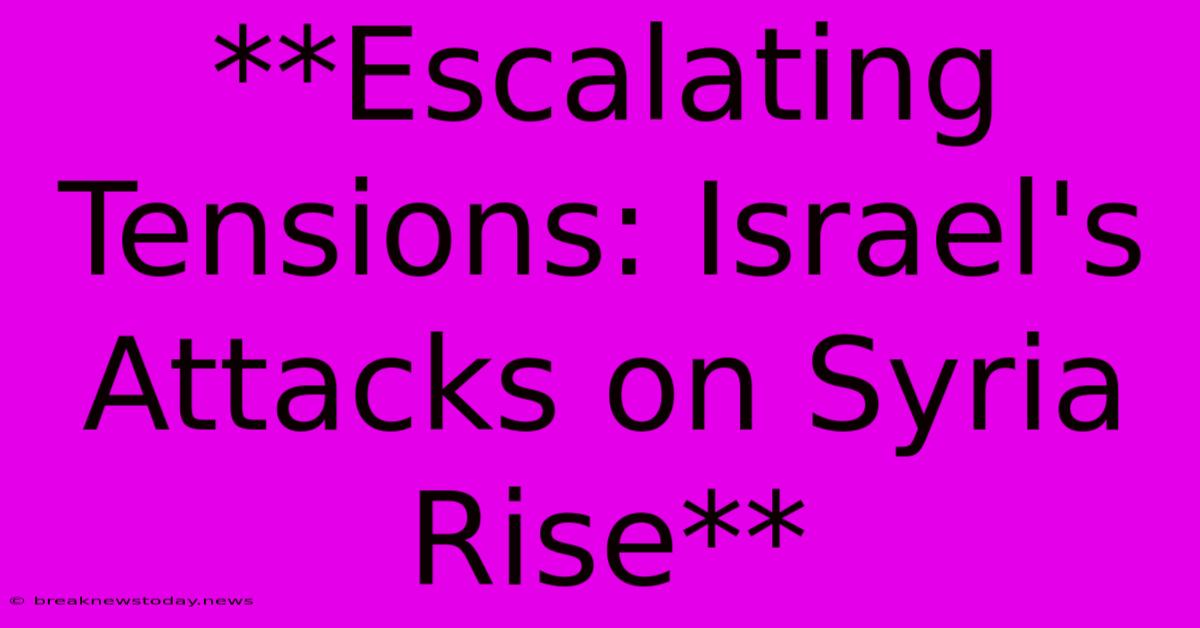**Escalating Tensions: Israel's Attacks On Syria Rise**

Discover more detailed and exciting information on our website. Click the link below to start your adventure: Visit Best Website naughtynakes.com. Don't miss out!
Table of Contents
Escalating Tensions: Israel's Attacks on Syria Rise
The Middle East remains a volatile region, with tensions simmering constantly. Recent months have seen a significant escalation in Israeli military activity in Syria, raising concerns about the potential for a wider conflict. This article will delve into the rising tensions, exploring the reasons behind Israel's increased strikes and their potential consequences.
Israel's Rationale for Strikes
Israel claims its airstrikes in Syria are aimed at preventing the transfer of advanced weaponry to Hezbollah, a Lebanese Shia militant group backed by Iran. Israel views Hezbollah as a significant security threat, particularly due to its vast arsenal of missiles and its stated intention to destroy Israel.
The increasing presence of Iranian-backed forces in Syria, including the elite Quds Force, has further fuelled Israel's concerns. These forces have established a foothold in the region, posing a potential threat to Israel's northern border.
Furthermore, Israel is concerned about Iran's growing influence in Syria, which it sees as a direct challenge to its regional security. Israel has repeatedly stated its intention to prevent Iran from establishing a permanent military presence in Syria.
The Impact on Syria
The relentless Israeli airstrikes have caused significant damage to Syria's infrastructure, including military facilities, weapons depots, and civilian infrastructure. These attacks have resulted in numerous casualties, both civilian and military, further exacerbating the humanitarian crisis in Syria.
The strikes have also complicated efforts to rebuild Syria, which has been devastated by a protracted civil war. They serve as a constant reminder of the ongoing conflict and the fragile peace that prevails in the region.
Regional Implications
The escalating tensions between Israel and Syria have significant implications for the wider region. The increased military activity risks drawing other regional powers into the conflict, further escalating tensions and potentially leading to a wider regional war.
The conflict also has implications for international efforts to resolve the Syrian civil war. The continued violence makes it difficult to achieve a lasting peace and complicates efforts to address the humanitarian crisis.
International Reactions
The international community has expressed concerns over the escalating tensions and called for restraint. However, there has been little concrete action to de-escalate the situation. The US, Israel's closest ally, has largely supported its actions, while Russia, Syria's main backer, has condemned the strikes.
The escalating tensions between Israel and Syria highlight the complex and volatile nature of the Middle East. The conflict is a multifaceted issue with deep historical roots, and finding a lasting solution will require concerted efforts from all parties involved.
In conclusion, the increasing frequency and intensity of Israeli airstrikes in Syria are a worrying trend. The attacks are exacerbating the humanitarian crisis, complicating efforts to rebuild Syria, and raising the risk of a wider regional conflict. The international community must work together to find a way to de-escalate the situation and prevent further bloodshed.

Thank you for visiting our website wich cover about **Escalating Tensions: Israel's Attacks On Syria Rise**. We hope the information provided has been useful to you. Feel free to contact us if you have any questions or need further assistance. See you next time and dont miss to bookmark.
Featured Posts
-
Ringier Lehnt Spiess Hegglins Forderung Nach Gewinn Ab
Nov 03, 2024
-
Immigrant Affairs Hosts Dia De Muertos Event
Nov 03, 2024
-
Vossloh Aktie Jefferies Senkt Ziel Haelt Kaufempfehlung
Nov 03, 2024
-
Snoop Dogg In Fortnite Everything You Need
Nov 03, 2024
-
Historische Instrumente Lutz Dirigiert Brahms Requiem
Nov 03, 2024
